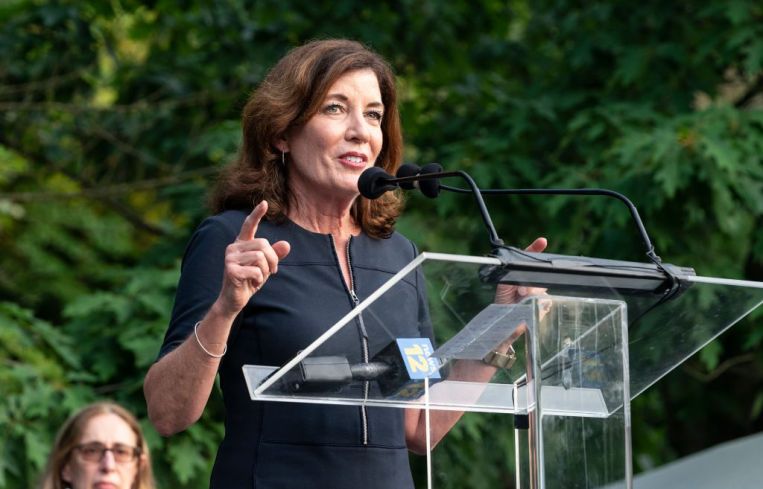New York State Extends Eviction Moratorium Until Mid-January
By Aaron Short September 2, 2021 10:29 am
reprints
Albany lawmakers passed an extension of an eviction moratorium on apartments late Wednesday night to keep nearly 1 million New Yorkers in their homes through mid-January, after the U.S. Supreme Court partially blocked the state order last month.
Gov. Kathy Hochul called a rare September special session on Tuesday once legislative leaders agreed in principle to extend a moratorium to Jan. 15, 2022, on residential and commercial evictions that had expired on Aug. 31.
She called the high court’s decision that blocked eviction plans “heartless.”
“We are not going to allow people, who through no fault of their own lost income, not able to pay, and facing eviction,” Hochul said Tuesday. “We are not going to allow that to happen here in the great state of New York. We are not going to abandon our neighbors in need.”
The rule allowed tenants to submit a hardship declaration to their landlords, demonstrating that the pandemic caused the loss of work and an inability to pay rent, in order to avoid a housing court hearing. Nearly 830,000 New Yorkers were behind on their rent, according to a National Equity Atlas analysis of U.S. Census data in July.
Former Gov. Andrew Cuomo ordered the moratorium in March 2020, as the pandemic gripped the city, and repeatedly renewed the state order. The state also initiated an emergency rental assistance program (ERAP) that would pay up to 12 months of back rent to low-income tenants struggling to pay their bills, although the program had only paid out $1 million of its $2.7 billion purse by the end of July.
But the nation’s highest court ruled that tenants must show evidence they suffered financial hardship, including earnings records in an eviction proceeding that a landlord initiates.
State lawmakers spent Wednesday afternoon revising the law so it could survive a likely court challenge from landlord groups.
“Between an anti-tenant Supreme Court decision and an emergency rent relief program badly administered by the previous governor, our eviction moratorium needed to be extended to give more time for tenants and landlords alike to be made whole,” state Senate Deputy Majority Leader Michael Gianaris said Wednesday after the Senate passed the measure 38 to 19. “With the extra time we have given New Yorkers, we are helping our small landlords and the housing stressed at a time when it is more important than ever.”
Tenant advocacy leaders claimed victory and credited the civil disobedience of activists for keeping pressure on state lawmakers.
“We hope that today’s legislation reflects a new and lasting reality in Albany: one in which tenants and homeless people have an ally in the governor’s office,” said Cea Weaver, campaign director for Housing Justice for All, a statewide coalition of tenant groups.
Property owners were more skeptical of the legislation. Jay Martin, who represents owners of rent-stabilized buildings through the Community Housing Improvement Program, said the state must focus on getting tenants to apply for rental assistance.
“Eviction moratoriums delay evictions, they do not prevent them,” Martin said. “What will prevent evictions is reforming and improving [ERAP], so it is easier for struggling renters and small property owners to sign up and get the help they need.”
Landlord groups previously filed several lawsuits to stop New York’s eviction ban, and the Rent Stabilization Association already threatened to sue against the latest moratorium before it even passed, Crain’s New York Business reported.
The eviction moratorium measure capped a busy day at the New York State Capitol, where lawmakers also confirmed two Hochul nominees to jump-start the state’s recreational marijuana program. Assembly members approved former Brooklyn Assemblywoman Tremaine Wright as chair of the Cannabis Control Board and Christopher Alexander, former policy director of the Drug Policy Alliance, as executive director of the Office of Cannabis Management.
Cuomo was previously criticized for the slow pace in moving recreational marijuana forward — including not appointing people on the Cannabis Control Board and the Office of Cannabis Management. Hochul previously said moving the program forward would be a priority for her.
Hochul also announced the appointment of former Democratic mayoral candidate and former New York City Department of Sanitation commissioner Kathyrn Garcia as director of state operations, one of the top non-elected positions in state government.



